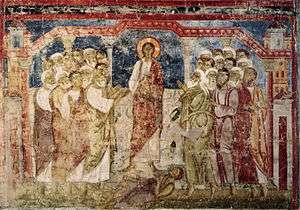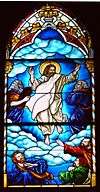Jesus in the synagogue of Capernaum

All four gospels report that Jesus visited Capernaum and often attended the synagogue there:
- Matthew 4:23 describes Jesus leaving Nazareth and settling in Capernaum
- Mark 1:21-28 describes Jesus teaching and healing in the synagogue
- Luke 4:31-37 describes Jesus teaching regularly in the synagogue, cf. Luke 4:23
- John 6:22-59: contains Jesus' Bread of Life Discourse; verse 59 confirms that Jesus taught this doctrine in the Capernaum synagogue.
John Chijioke Iwe argues that the Markan pericope marks the beginning of the last year of the three years of the public ministry of Jesus.[1]
An exorcism performed in the synagogue is one of the miracles of Jesus, recounted in Mark 1:21–28 and Luke 4:31–37.[2][3][4]
Jesus and his disciples went to Capernaum, and Jesus began to teach on the Sabbath. People were amazed at his teaching, because he taught them as one who had authority, not as the teachers of the law. Just then a man in their synagogue who was possessed by an evil spirit cried out, "What do you want with us, Jesus of Nazareth? Have you come to destroy us? I know who you are — the Holy One of God!"
- "Be quiet!" said Jesus sternly. "Come out of him!"
The evil spirit shook the man violently and came out of him with a shriek.
The people were all so amazed that they asked each other, "What is this? A new teaching — and with authority! He even gives orders to evil spirits and they obey him." News about him spread quickly over the whole region of Galilee.[5]
See also
References
- ↑ John Chijioke Iwe (1991), Jesus in the Synagogue of Capernaum: The Pericope and its Programmatic Character for the Gospel of Mark ISBN 9788876528460 p. 7
- ↑ Reading Luke by Charles H. Talbert 2002 ISBN 1573123935 pages 61–62
- ↑ Biblegateway Mark 1:21–28
- ↑ Biblegateway 4:31–37
- ↑ Mark 1:21–28
